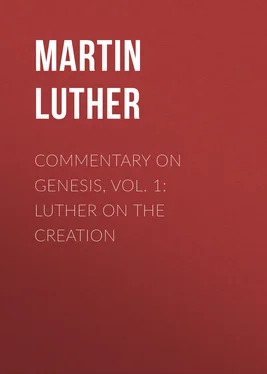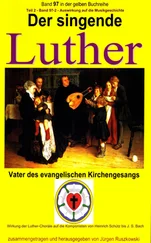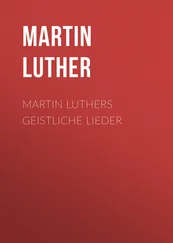Martin Luther - Commentary on Genesis, Vol. 1 - Luther on the Creation
Здесь есть возможность читать онлайн «Martin Luther - Commentary on Genesis, Vol. 1 - Luther on the Creation» — ознакомительный отрывок электронной книги совершенно бесплатно, а после прочтения отрывка купить полную версию. В некоторых случаях можно слушать аудио, скачать через торрент в формате fb2 и присутствует краткое содержание. Жанр: foreign_prose, foreign_religion, Философия, foreign_psychology, foreign_antique, на немецком языке. Описание произведения, (предисловие) а так же отзывы посетителей доступны на портале библиотеки ЛибКат.
- Название:Commentary on Genesis, Vol. 1: Luther on the Creation
- Автор:
- Жанр:
- Год:неизвестен
- ISBN:нет данных
- Рейтинг книги:4 / 5. Голосов: 1
-
Избранное:Добавить в избранное
- Отзывы:
-
Ваша оценка:
- 80
- 1
- 2
- 3
- 4
- 5
Commentary on Genesis, Vol. 1: Luther on the Creation: краткое содержание, описание и аннотация
Предлагаем к чтению аннотацию, описание, краткое содержание или предисловие (зависит от того, что написал сам автор книги «Commentary on Genesis, Vol. 1: Luther on the Creation»). Если вы не нашли необходимую информацию о книге — напишите в комментариях, мы постараемся отыскать её.
Commentary on Genesis, Vol. 1: Luther on the Creation — читать онлайн ознакомительный отрывок
Ниже представлен текст книги, разбитый по страницам. Система сохранения места последней прочитанной страницы, позволяет с удобством читать онлайн бесплатно книгу «Commentary on Genesis, Vol. 1: Luther on the Creation», без необходимости каждый раз заново искать на чём Вы остановились. Поставьте закладку, и сможете в любой момент перейти на страницу, на которой закончили чтение.
Интервал:
Закладка:
Luther began this work at Wittenberg in his lectures to the university students in 1536, and ended it after ten years of labor, Nov. 17, 1545, only a few months before his death. So John Mathesius reports in his "Sermons on the Life of Luther," and then adds, Luther because of worry left Wittenberg for a time to visit the Prince of Anhalt, at Merseburg, and wrote, "Upon his return home, he finished his Genesis, Nov. 17, 1545, on which he had labored ten years." Ludwig von Seckendorf's "History of Lutheranism" is the authority that he began this work in 1536, while in the margin of the Latin edition is printed that he entered upon the exposition of the twenty-second chapter, Oct. 27, 1539.
In the meantime the wisdom of God directed that this glorious treasure should not lie buried, but should be brought to light for the quickening of many souls, and issued periodically in parts. The beginning was made while Luther was still living, and the first part, the Creation and the Flood, appeared in 1545, containing his lectures on the first eleven chapters of Genesis, edited by Veit Dietrich, who heard Luther deliver the lectures while a student at Wittenberg, to which he wrote a dedication, and Luther added a short but precious "Address to the Christian Reader" [both of which we print in full]. Luther died in 1546, and Veit Dietrich in 1549, but Jerome Besoldus, pastor at Nuremberg, continued the work and issued the three other parts or volumes at Nuremberg. The second volume, The History of Abraham, with a preface by Michael Roting, professor at Nuremberg, from the twelfth chapter to verse 10 of the twenty-fifth chapter, was published in 1550. The third volume, to the thirty-sixth chapter, appeared in 1552, with a preface by Philip Melanchthon, and the fourth volume to the end of Genesis, in 1554, prefaced by Besoldus himself. Jerome Baumgartner, a councilman of Nuremberg, and a great lover of Luther's writings, appointed Besoldus to this work upon the death of Veit Dietrich, Melanchthon and Rorary approving. Jerome Besoldus studied at Wittenberg, heard these lectures from Luther's mouth, and diligently wrote a large part of them as they were delivered. He stayed in the home of Luther and ate at his table. He made use, also, of what Dietrich, Cruciger, Rorary and Stoltz had written from Luther's mouth. He says when Veit Dietrich died while preparing the second volume, the enemies of the Gospel sought to prevent its publication, and there was little hope that it should appear in print complete. But God graciously heard the prayers of the godly in these dark and distressing days, who longed for the last and best writings of their beloved Luther, when Councilman Baumgartner resolved that at least what Veit Dietrich had prepared for the second volume should appear, and the result was the work complete was printed.
This commentary was delivered to the students in Latin and first published in that language. But soon arrangements were perfected to issue it in German. Basil Faber, who died while rector in Erfurt, a celebrated educator, translated the first two volumes, whose dedication we give in full; and John Guden, senior pastor at Brunswick, translated volumes three and four, and his dedication was to the same person and written on Epiphany of the same year, 1557, a little before Faber's dedication.
Other editions of the commentary, both in Latin and German, followed, and then it was incorporated in the editions of the complete works of Luther; in the Wittenberg edition, in Latin and German, and in the Altenburg and the Leipsic collections in German, and all subsequent editions.
That Luther himself did not make much of this work is a proof of his humility and that he ascribed nothing to himself, but all to the grace of God. Nevertheless the commentary is worthy of all the praise it has received. In the Formula of Concord our forefathers referred to it as a "Commentarius praeclarus," or an excellent commentary and the Leipsic and Wittenberg theologians in their final report and explanation, especially against Flacius, mention "The Augsburg Confession," the Postils, and other sermons of Luther which are full of the precious teachings and strong consolation of the Holy Ghost, and all his other books on doctrine, especially those written after the Diet of Augsburg, in 1530, among the best of which are his explanations of certain Prophets and the Psalms, the Epistle to the Galatians; and in this select list is classified the "Commentary on Genesis." They designate it as a "rich exposition, with which he closed his calling, his ministerial office and his life in a blessed way. Because of this we justly esteem it highly. For in the same commentary he gave full and free expression to his last convictions and confession on most of the articles of the Christian faith and bequeathed them to the world."
In like manner have other divines of our Church judged of this commentary and held that we should esteem it highly and that it proves Luther was truly a great expounder of the Scriptures. (Basil Faber's dedication is quoted at length here, also Veit Dietrich at other places, but we refer the reader to their documents, which we give in full.)
John Guden says: "Luther has left us in this Commentary a rich treasury as a legacy, and what a valuable treasure it is, they will truly learn, who diligently read it. As a summary, one finds here the true kernel of the doctrine our God has revealed to us through Dr. Luther, as Melanchthon, Jonas and other spiritual men have also rightly judged."
Mathesius with good spiritual taste says: "He who learns to know Christ in Genesis has instruction in the power of the divine Word and knows what sin and righteousness are, which avail before God. My testimony concerning this blessed Commentary I wish to leave behind me that my natural and spiritual children may not forget it, but esteem it highly all their lives. My Genesis, for the sake of instruction and consolation, I have frequently read through, underscored and described. Remember this commentary explained to me the Word and will of Christ, and from it God gave comfort, rest and life to my troubled soul. For when our case is like the suffering of the patriarchs and the exposition suits one's heart as if the Doctor really speaks with us, then the Commentary is incorporated in us and lives in us, and refreshes and quickens one's heart." Joachim Morlin, in "How to Read With Profit the Writings and Books of the Beloved and Blessed Man of God, Dr. Martin Luther," praises above all others this Commentary and says: "Read the following 'Consummatum Est,' 'It Is Finished,' of this holy man, 'The Beloved Genesis,' in which as in a new world he brings forth and opens up not only certain parts but all the treasures and riches of the wisdom of the divine Word, so that there is not another book like it on earth since the times of the apostles. Luther's Genesis makes all theologians scholars." Jerome Weller says: "Luther's Commentary on Genesis is his Swan Song. For although all Luther's writings are full of manifold doctrines and consolations, yet his Commentary on Genesis excels all others. There is hardly a temptation for which he has not given in this Commentary a sure remedy; yes, Luther has excelled himself in this Commentary. Therefore I continually admonish all theological students again and again that they read this commentary diligently and assiduously and never lay it out of their hands, but seek to be wedded to it. For I can assure you I received more benefit from this commentary than from almost all the other writings of Luther. Therefore I will never be satisfied nor tired of reading it. If all that has been written since the apostles were gathered in one heap, they would not be worthy to be compared with this Commentary. I know that I speak the truth, and all who have experienced the truth and learned theologians share my convictions."
Читать дальшеИнтервал:
Закладка:
Похожие книги на «Commentary on Genesis, Vol. 1: Luther on the Creation»
Представляем Вашему вниманию похожие книги на «Commentary on Genesis, Vol. 1: Luther on the Creation» списком для выбора. Мы отобрали схожую по названию и смыслу литературу в надежде предоставить читателям больше вариантов отыскать новые, интересные, ещё непрочитанные произведения.
Обсуждение, отзывы о книге «Commentary on Genesis, Vol. 1: Luther on the Creation» и просто собственные мнения читателей. Оставьте ваши комментарии, напишите, что Вы думаете о произведении, его смысле или главных героях. Укажите что конкретно понравилось, а что нет, и почему Вы так считаете.












